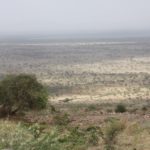
Jordan is the type of separation where there is no fellowship with anyone else, and where no one can take the responsibility for you.1
How many years had Elisha walked with his mentor, Elijah? Seven? Eight? How many times had he witnessed the power of God come down through the words and deeds of the great prophet? Countless times. And now….
For days now, Elisha has known the time was at hand. Three times the prophet had told his young protege, stay here while I go into the city. Three times, Elisha has refused, insisting that he stay by his side. And in each city, the locals remind him that his master’s days are numbered. I know, he says. Shut up and don’t remind me! And now….
Now Elijah has disappeared, taken up miraculously from before his very eyes. Chariots. Horses. Fire. A whirlwind. And when the tumult dies down, Elisha is alone. Alone on the banks of the river they had crossed together only moments before.
The thunderous drama of the prophet’s exit only magnifies the deafening silence in which Elisha now stands; Elijah’s billowing cloak, now lying in a dusty clump on the parched ground, the only sign that he’d ever been there. And now….
Such spectacles do not come frequently in our lives, but the times of aloneness are all-too-common. We leave the spiritual height of a mission trip and, on returning home, find that no one really understands, and too few even seem to care. We meet God at a mountain camp, only to return to the doldrums of daily life back at sea level. We are fêted well as we say goodbye to a ministry we have loved and prospered, then find ourselves alone and waiting by the Jordan for some sign that we are not really alone.
And there on the banks of our own Jordan, as Chambers says, “you have to put to the test now what you learned when you were with your Elijah. … If you want to know whether God is the God you have faith to believe Him to be, then go through your Jordan alone.”
Think about that for a moment: Do you want to know whether God is the God you think He is? You can only know it when you get alone. No one can know it for you. Friends, mentors, a spouse… they can all tell you it’s true… that God is true. But only you can know it.
In order to know he was not alone, Elisha had to pick up the prophet’s cloak and put it around his own shoulders. What is that cloak for you? Perhaps a Bible that has sat too long untouched. For me it was a Jacob-like wrestling match with God (see Genesis 32:22-32).
Pick up the cloak and know the truth of what you believe.
1 [Oswald Chambers, My Utmost For His Highest, Aug 11. See 2 Kings 2:1-25.]
